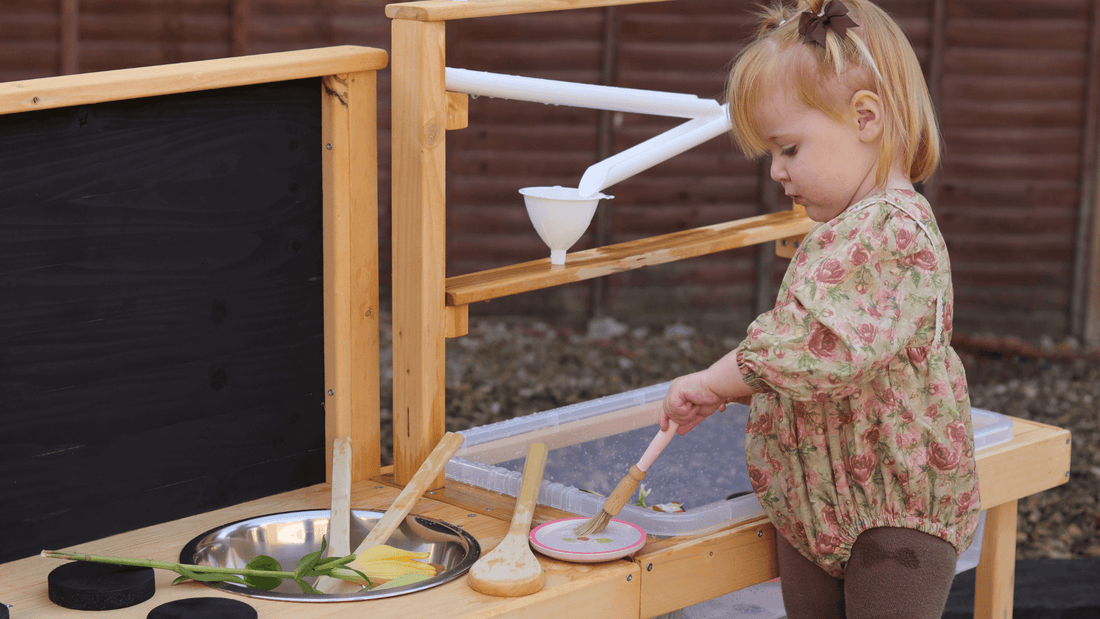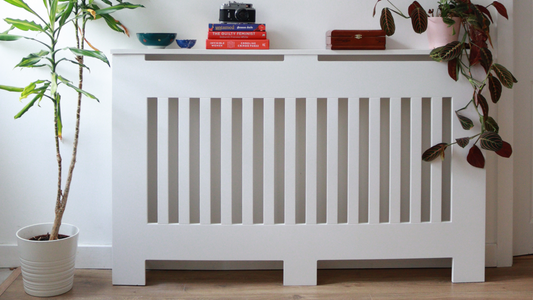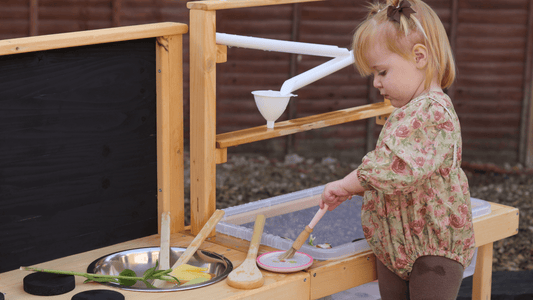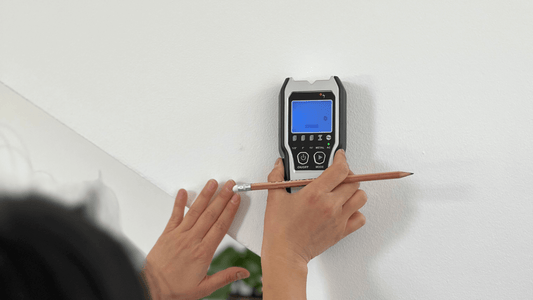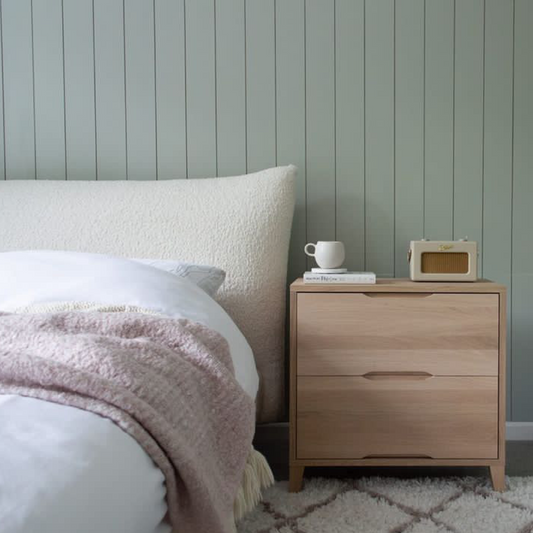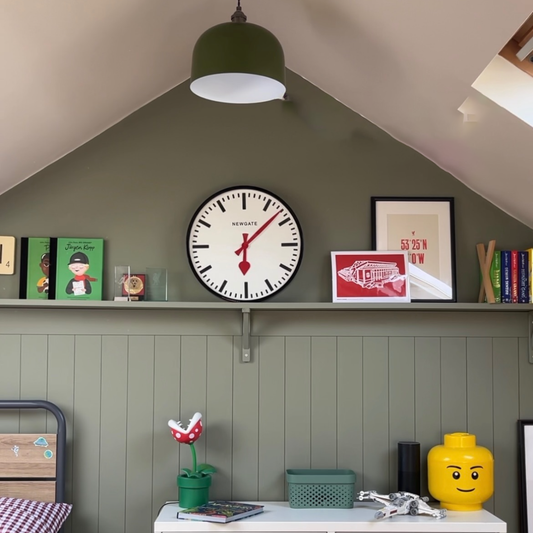Most of us remember playing or being covered in mud head to toes much to the annoyance of our parents who had to take us straight to the bathtub. What we may not have realised back then is that playing with mud was helping us to learn and develop. Before we dive deep into all the benefits your little one will soak up by engaging into this muddy adventure, let's start with the basics, what exactly is a mud kitchen?
A mud kitchen is a mini outdoor kitchen that you can install in your garden. It’s a special space where your kid can engage in imaginative and sensory play with mud, water, and natural materials. As they are designed to resemble real kitchens, complete with various containers, utensils, and work surfaces. Children get the chance to mimic the activities they observe the grownups doing in the kitchen, such as mixing, pouring, and cooking.
In line with Montessori's philosophy of hands-on, child-centred learning, mud kitchens can help your little ones develop essential life skills and gain a deeper understanding of the world around them.

What are the features you can add to your mud kitchen?
Work Surfaces: In this area children can mix, stir, and create their own food using mud, sand, water, and other natural materials
Containers: These can be bowls, pots, pans, buckets, and cups, great for holding mud and water
Utensils: You can hang various utensils and tools like spoons, spatulas, ladles, and brushes, allowing children to interact with the materials in different ways
Natural Materials: You can incorporate natural elements like rocks, sticks, leaves, flowers, to enhance sensory play.
Full water run table: To help with the mixing of materials you can install a water table extension and connect it to a water source
Other compartments: Pizza oven, blackboard and shelves or a drop down ovens are some creative customisations you can make

Why are Montessori mud kitchens considered so beneficial for children?
Sensorial exploration: Mud kitchens encourage children to engage in hands-on, sensory play. Children can touch, feel, and explore the different textures and consistencies of mud, sand, water, and natural materials. This sensory exploration helps develop their sense of touch and enhances their understanding of the physical world.
Nature connection: Because mud kitchens typically incorporate natural materials like wood, stones, and plants, they can help children develop a stronger connection to the natural world and foster an appreciation for the environment.
Creativity and imagination: By providing an open-ended and unstructured play environment, children are allowed to use their creativity and imagination freely. They can create various dishes, experiment with mixing materials, and come up with imaginative scenarios and stories.

Fine and gross motor skills: Activities in a mud kitchen, such as scooping, pouring, stirring, and building, help children develop their fine and gross motor skills. These activities require precision and coordination, contributing to their physical development.
Practical life skills: Montessori education places a strong emphasis on practical life skills. Mud kitchens offer opportunities for children to engage in tasks such as measuring, and cleaning up. These activities help children to practise and reenact social skills in a playful setting.
Social and emotional development: Playing in a mud kitchen with friends and family can foster social interaction and cooperation. Children learn to negotiate, share, and work together, which enhances their social and emotional development. They also gain a sense of responsibility as they collaborate on tasks like cleaning up the kitchen after play.

Problem-solving and critical thinking: Mud play encourages children to explore cause-and-effect relationships and experiment with different materials. This hands-on experimentation promotes problem-solving and critical thinking skills.
Language development: Children engage in conversation and communication while playing in a mud kitchen. This helps build their vocabulary, language skills, and the ability to express their thoughts and ideas.
Independence and confidence: Montessori principles emphasise fostering independence and self-confidence in children. Mud kitchens provide a safe and supportive environment for children to take initiative, make choices, and learn from their experiences, which promotes their independence and self-esteem.
In a nutshell, Montessori mud kitchens are great for children because they offer a holistic and developmentally appropriate approach to learning and play.

What age groups are best suited for mud kitchens?
Mud kitchens are a great play activity for young children and can be enjoyed by kids in nursery and primary school age groups. Typically, children between the ages of 2 to 7 years old are the primary participants in mud kitchen play. Here's a breakdown of how different age groups might benefit from and enjoy mud kitchens:
Toddlers (2-3 years old): Toddlers can start exploring mud kitchens under close supervision. They will enjoy the sensory experience of squishing mud, pouring water, and making simple "recipes." Mud play can help develop their fine motor skills, creativity, and an understanding of cause and effect.
Nursery (3-5 years old): Children in nursery school get to engage in more complex imaginative play, using the mud as ingredients in their "cooking" adventures. This activity encourages creativity, social interaction, and language development.
Primary School (5-7 years old): Older children in this age group can continue to enjoy mud kitchens. They might develop more sophisticated storytelling and role-playing scenarios. They can also incorporate natural materials like leaves, twigs, and stones into their mud creations. Mud kitchens can be a great tool for teaching science concepts like states of matter, plant growth, and more.
Looking to incorporate a mud kitchen into your outdoor space? Our mud kitchen collection is handmade by local artisans and customised to your design. It’s made of treated wood to prevent against mould & insects and is fully finished with no sharp edges.

